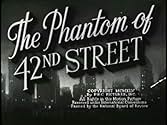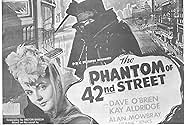Agrega una trama en tu idiomaA theatre critic (Dave O'Brien) teams up with a cop (Jack Mulhall) to investigate the murder of a Broadway actor.A theatre critic (Dave O'Brien) teams up with a cop (Jack Mulhall) to investigate the murder of a Broadway actor.A theatre critic (Dave O'Brien) teams up with a cop (Jack Mulhall) to investigate the murder of a Broadway actor.
Fred Aldrich
- Detective
- (sin créditos)
Budd Buster
- Mike - Stage Doorman
- (sin créditos)
Tom Coleman
- Senator in Play
- (sin créditos)
Oliver Cross
- Theater Patron
- (sin créditos)
Tom Ferrandini
- Theatre Patron
- (sin créditos)
Joe Gilbert
- Theatre Patron
- (sin créditos)
Pat Gleason
- Reporter
- (sin créditos)
Opiniones destacadas
After watching this poverty row mystery -- and re-running the climactic scene three or four times -- there's no need for a spoiler alert. I still have no idea who committed the murders nor why. Which sorta' takes the wind out of watching Dave O'Brien as the drama critic for the New York Record playing amateur sleuth, probing the slayings that are decimating the cast of a New York repertory theater. Then again, why was the film called "Phantom of 42nd Street" when live theater had long given way to grind movie houses on 42 Street by the time it was made in the 1940s? That's easy. While "Phantom of 47th Street Between Seventh and Eighth Avenues" would have been more accurate, it wouldn't have had nearly the cache. And fitting it on marquees -- especially at theaters that played PRC releases -- would have been a challenge.
The Phantom Of 42nd Street from PRC is a not too bad murder mystery of a group of people connected to a theatrical company. Theater critic Dave O'Brien is on the job reviewing a play when the first murder is committed. He gets drafted into the job of covering this and the other murders as they are committed. The ultimate target seems to be Alan Mowbray who is the actor/manager of the company and his daughter Kay Aldridge.
It all goes back to some dirt done the murderer many years ago by many members of the company both in front of and backstage. The culprit has gone quite nuts about it, no doubt fixating for many years on how he would do the job. It is a he, I'll give that much away.
Having a critic be a detective is an intriguing plot premise. Surprisingly the cops seem to warm up quickly to the outside help they're getting unlike in so many of these mysteries.
At a major studio this might have been a minor classic with a lot of the holes in the plot not existing. Still for a PRC film it's far from the worst I've seen.
It all goes back to some dirt done the murderer many years ago by many members of the company both in front of and backstage. The culprit has gone quite nuts about it, no doubt fixating for many years on how he would do the job. It is a he, I'll give that much away.
Having a critic be a detective is an intriguing plot premise. Surprisingly the cops seem to warm up quickly to the outside help they're getting unlike in so many of these mysteries.
At a major studio this might have been a minor classic with a lot of the holes in the plot not existing. Still for a PRC film it's far from the worst I've seen.
A newspaper's drama critic turns detective when he gets mixed up with murder among members of a theatre company. Eventually, a series of murders occurs apparently committed by a mysterious phantom.
Not a bad little detective mystery from low-budget PRC. That's thanks mainly to a lively turn from O'Brien as Woolrich and the decorous Kay Aldridge as Claudia. Then there's the familiar Frank Jenks as the comedy relief cabbie, and a surprisingly delightful Vera Marshe as the lame brain waitress Ginger. The screenplay makes good use of its theatrical setting, and I suspect many of those backstage set-ups were real backstage scenes from PRC's sound stage. Of course, 50-some minutes is scarcely enough time to develop a strong list of suspects or mystery plot, but there's enough colorful characterizations to compensate. All in all, an adequate little time-passer.
Not a bad little detective mystery from low-budget PRC. That's thanks mainly to a lively turn from O'Brien as Woolrich and the decorous Kay Aldridge as Claudia. Then there's the familiar Frank Jenks as the comedy relief cabbie, and a surprisingly delightful Vera Marshe as the lame brain waitress Ginger. The screenplay makes good use of its theatrical setting, and I suspect many of those backstage set-ups were real backstage scenes from PRC's sound stage. Of course, 50-some minutes is scarcely enough time to develop a strong list of suspects or mystery plot, but there's enough colorful characterizations to compensate. All in all, an adequate little time-passer.
THE PHANTOM OF 42ND STREET is one of those cheap and bland detective stories that bulked out cinema screens back in the 1940s. This one's about a murder at a theatre, and while the genuine cops appear perplexed, our plucky journalist hero turns out to display a surprisingly aptitude for sleuthing. There's a lightness of touch here at times which works well and allows the production to breathe, but the nuts and bolts of the plotting is very creaky and there's a dearth of interesting characters which makes it a struggle to sit through. If you like Shakespeare then the snippets we see of the era might interest you, but otherwise this is bland stuff.
Tony Woolrich is an oddity for '40s mysteries—a newspaper man who decidedly does not think of himself as a detective. In fact, this film opens with a murder at the theater, and all theater critic Woolrich wants to do is get back to his paper and review the play. He is encouraged to pursue the mystery by his editor, who is understandably upset that the paper has missed a big scoop, and also by his sidekick, Romeo the cab driver. Eventually throwing himself into the job, Tony turns out to be surprisingly good at detective work (for a drama critic, anyway!) and his connections in the theater world help him quickly surpass the little progress achieved by rather dim police detective Walsh (Jack Mulhall).
Dave O'Brien as Tony is earnest and appealing; Frank Jenks as Romeo is appropriately helpful and smart-alecky. (Tony: "I know it's a boorish thing to do but I'd like to follow her." Romeo: "All detectives are boorish, don't let that worry you.") Kay Aldridge is good but unmemorable as leading lady Claudia Moore in a role that doesn't offer much in the way of surprises.
Alan Mowbray is fun as the famous actor at the center of the mysterious events, and even gets to declaim a few lines from Julius Caesar in a climactic scene.
Disguises, old grudges, secret marriages oh, those actors' lives are so full of intrigue!
Dave O'Brien as Tony is earnest and appealing; Frank Jenks as Romeo is appropriately helpful and smart-alecky. (Tony: "I know it's a boorish thing to do but I'd like to follow her." Romeo: "All detectives are boorish, don't let that worry you.") Kay Aldridge is good but unmemorable as leading lady Claudia Moore in a role that doesn't offer much in the way of surprises.
Alan Mowbray is fun as the famous actor at the center of the mysterious events, and even gets to declaim a few lines from Julius Caesar in a climactic scene.
Disguises, old grudges, secret marriages oh, those actors' lives are so full of intrigue!
¿Sabías que…?
- TriviaClaudia Moore (Kay Aldridge) drives a 1941 Buick convertible.
- ErroresWhen someone takes a shot at Tony backstage, incredibly, most of the people backstage don't hear the shot.
Selecciones populares
Inicia sesión para calificar y agrega a la lista de videos para obtener recomendaciones personalizadas
Detalles
- Tiempo de ejecución58 minutos
- Color
- Relación de aspecto
- 1.37 : 1
Contribuir a esta página
Sugiere una edición o agrega el contenido que falta

Principales brechas de datos
By what name was The Phantom of 42nd Street (1945) officially released in Canada in English?
Responda


























